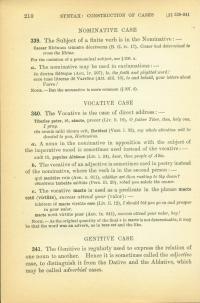340. The vocative is the case of direct address.
Tiberīne pater, tē, sāncte, precor. (Liv. 2.10)
O father Tiber, thee, holy one, I pray.
Rēs omnis mihi tēcum erit, Hortēnsī. (Verr. 1.33)
My whole attention will be devoted to you, Hortensius.
a. A noun in the nominative in apposition with the subject of the imperative mood is sometimes used instead of the vocative.
Audī tū, populus Albānus. (Liv. 1.24)
Hear, you people of Alba.
b. The vocative of an adjective is sometimes used in poetry instead of the nominative, where the verb is in the 2nd person.
Quō moritūre ruis? (Aen. 10.811)
Whither are you rushing to your doom?
Cēnsōrem trabeāte salūtās. (Pers. 3.29)
Robed, you salute the censor.
c. The vocative macte is used as a predicate in the phrase macte estō (virtūte) [success attend your (valor)].
Iubērem tē macte virtūte esse. (Liv. 2.12)
I should bid you go on and prosper in your valor.
Macte novā virtūte puer! (Aen. 9.641)
Success attend your valor, boy!
Note— As the original quantity of the final e in macte is not determinable, it may be that the word was an adverb, as in bene est and the like.

